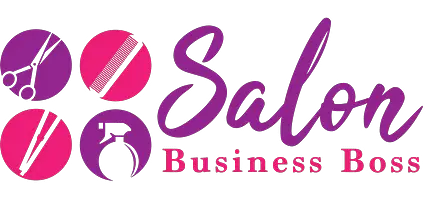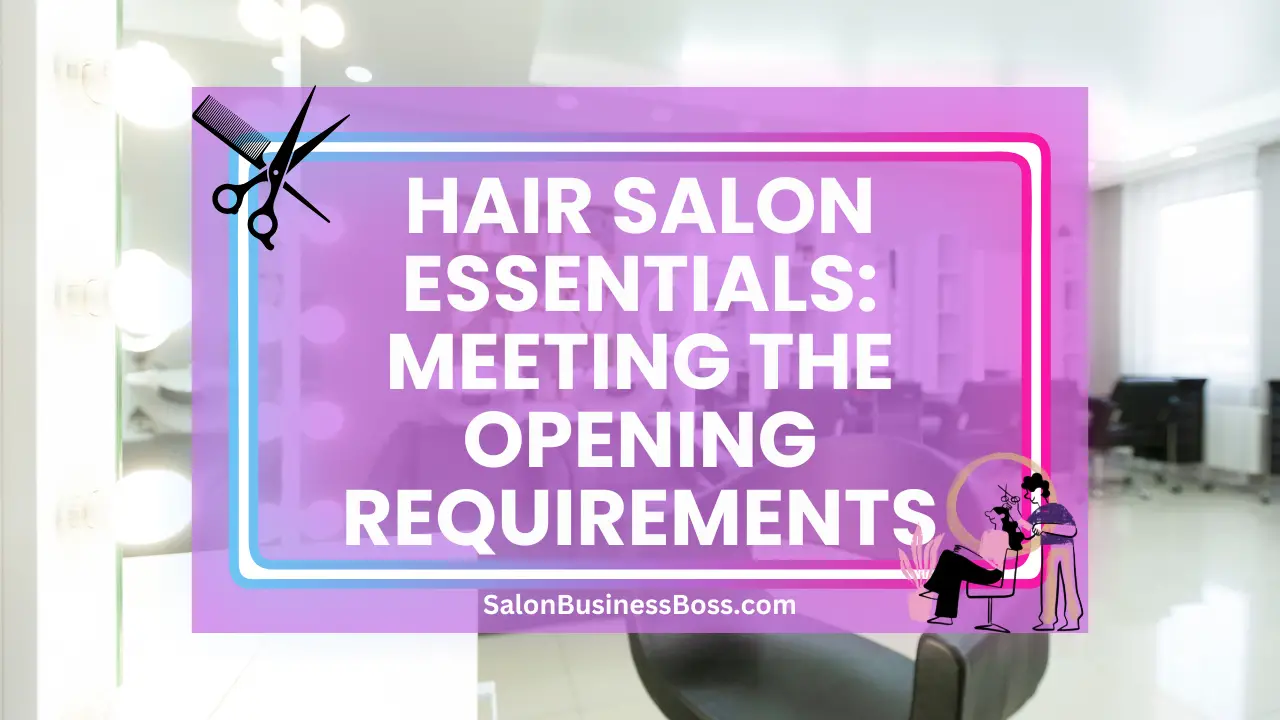Opening a hair salon can be an exciting and rewarding venture for aspiring entrepreneurs in the beauty and grooming industry. However, it requires careful planning, adherence to regulations, and a commitment to providing exceptional services to clients.
Requirements to open a hair salon include conducting market research, choosing the right legal structure, obtaining permits, securing a strategic location, investing in quality equipment, hiring qualified staff, emphasizing sanitation, branding and marketing, competitive pricing, efficient appointment management, excellent customer service, and comprehensive insurance coverage. Financial management is crucial for long-term success.
Market Research and Business Plan
Before venturing into the hair salon business, conducting thorough market research is a fundamental step. By analyzing the local market demand, target audience, and competitor landscape, you gain valuable insights to make informed decisions. Identify gaps in the market and understand the preferences of your potential customers. A well-structured business plan should follow the research, serving as a blueprint for your salon’s success. This plan should outline your salon’s vision and mission, clearly define your unique selling proposition, and detail the range of services offered.
A comprehensive business plan helps secure funding from investors or lenders. It showcases your understanding of the market, financial projections, and growth strategies, increasing the confidence of potential stakeholders. As your business evolves, the business plan acts as a flexible roadmap, guiding you through challenges and opportunities. Regularly revisiting and updating the plan ensures that your hair salon stays aligned with its goals and adapts to changing market dynamics.
Legal Structure and Permits
Choosing the right legal structure for your hair salon is a critical aspect of setting up your business. The options include sole proprietorship, partnership, or limited liability company (LLC). Each structure has its advantages and disadvantages concerning liability protection and tax implications. Consulting with legal professionals or business advisors can help you make the best choice for your specific circumstances.
Acquiring the necessary permits and licenses is essential for your salon’s compliance with local, state, and federal regulations. These may include general business licenses, health permits, and salon-specific certifications. Ensuring that you have all the required permits and licenses helps prevent legal issues and potential shutdowns, giving you the confidence to operate your hair salon with peace of mind.
Remember that regulations may vary depending on your location, so be diligent in researching and obtaining the appropriate documentation. Proper adherence to legal requirements demonstrates your commitment to operating a legitimate and responsible hair salon, building trust with both clients and authorities.
Location and Salon Layout
Selecting the right location is a critical factor in the success of your hair salon. Consider areas with high foot traffic, visible storefronts, and easy accessibility for your target clientele. Proximity to residential neighborhoods, shopping centers, or commercial areas can significantly influence your salon’s footfall. Understanding your ideal customer profile and their habits will help you identify the most suitable location.
Beyond location, the salon layout plays a crucial role in creating a positive customer experience. Design a layout that optimizes space and provides a seamless flow of services. Plan separate sections for cutting, styling, washing, and waiting areas to create a comfortable and inviting environment for customers.
Invest in stylish and comfortable salon furniture, ensuring that clients feel relaxed during their visit. Utilize strategic lighting and colors to create a warm and welcoming ambiance. Thoughtfully consider the placement of mirrors and functional equipment for hairstylists’ ease and efficiency.
An appealing salon layout not only enhances the overall customer experience but also allows your staff to deliver services seamlessly. Happy and satisfied customers are more likely to become loyal patrons and recommend your salon to others, contributing to the salon’s long-term success.
Equipment and Supplies

Investing in high-quality salon equipment and supplies is a crucial aspect of running a successful hair salon. The right equipment not only enhances the efficiency of your stylists but also leaves a lasting impression on your clients. Ensure that you have an adequate number of styling chairs, washbasins, hairdryers, and other essential tools to accommodate your salon’s capacity.
Maintaining a well-stocked inventory of hair care products is essential. Offer a variety of shampoos, conditioners, and styling products to cater to different hair types and preferences. Partner with reputable suppliers to source products known for their quality and effectiveness. The availability of an extensive product range enhances the salon experience for customers and allows your stylists to recommend suitable products for their hair needs.
Stay up-to-date with the latest advancements in salon equipment and technology to improve service quality and efficiency. Investing in cutting-edge tools demonstrates your commitment to delivering exceptional services, attracting both new and loyal customers.
Read more about: Dollars and Scissors: Evaluating Hair Salons’ Profit Potential
Qualified Staff and Training
The success of a hair salon relies heavily on the expertise and skill of its staff. Hiring qualified and experienced hairstylists, colorists, and support staff is vital to maintaining a high standard of service. Look for individuals who are not only talented but also possess excellent communication skills and a friendly demeanor. A welcoming and friendly staff creates a positive salon atmosphere that clients will enjoy.
Continual staff training is key to staying competitive in the dynamic beauty industry. Regularly invest in training programs and workshops to keep your team updated with the latest trends, techniques, and products. Well-trained stylists can offer clients the latest haircuts, coloring trends, and innovative styling options, setting your salon apart from the competition.
Encourage creativity and skill development within your team. Conduct in-house training sessions to reinforce best practices and salon-specific procedures. By investing in your staff’s professional growth, you foster loyalty and dedication among your team, which translates to exceptional service and client satisfaction.
Sanitation and Hygiene Practices
Maintaining stringent sanitation and hygiene practices is non-negotiable in a hair salon. Customers expect a clean and safe environment when they visit your salon for hair services. Regularly sanitize and disinfect all equipment and tools used during hair treatments to prevent the spread of infections and bacteria.
Adopt best practices for washing and disinfecting towels, capes, and other fabric-based salon items. Hygienic towels and capes provide a sense of comfort and confidence to clients, ensuring they feel well taken care of during their visit.
Displaying cleanliness and hygiene as a core value of your salon establishes trust with clients and fosters a positive reputation in the community. Implement visible sanitation stations, and communicate your commitment to maintaining a clean salon environment through posters or signs. Regularly inspect the salon’s hygiene practices to ensure compliance with industry standards and regulations.
By prioritizing sanitation and hygiene, you create a safe and welcoming space for your clients, enhancing their salon experience and encouraging repeat visits.
Branding and Marketing
In the highly competitive hair salon industry, establishing a strong brand identity is essential to stand out and attract a loyal customer base. Begin by creating a memorable logo that represents your salon’s personality and values. Select a unique color scheme that resonates with your target audience and creates a consistent visual identity across all branding materials.
Develop a cohesive brand message that communicates what sets your salon apart from the competition. Emphasize your salon’s strengths, whether it’s personalized services, eco-friendly products, or a particular hairdressing specialty. This brand messaging should be evident in your salon’s website, social media posts, marketing materials, and even in the way your staff interacts with clients.
Implement a comprehensive marketing strategy that incorporates both online and offline efforts. Your online presence is crucial, so invest in a professional website that showcases your salon’s services, team, and contact information. Engage with your audience through social media platforms like Instagram and Facebook, sharing before-and-after images, tutorials, and promotions.
While digital marketing is essential, don’t overlook traditional advertising methods. Distribute eye-catching flyers in your local community and collaborate with nearby businesses for cross-promotional opportunities.
Pricing and Services Menu
Determining competitive yet profitable pricing for your salon services is a delicate balancing act. Research the pricing strategies of your competitors and take into account factors like location, target market, and service quality. Offer various pricing tiers to cater to different budgets and hair needs. Consider bundling services into packages, providing clients with more value and encouraging repeat business.
Create a detailed services menu with clear descriptions for each service. Include haircuts, coloring options, styling, treatments, and any specialty services you offer. Explain the benefits of each service and provide transparency about pricing to avoid confusion or hidden costs.
Stay updated with the latest hair trends and industry advancements to ensure your services are relevant and appealing to clients. Consider incorporating add-on services, such as scalp massages or deep conditioning treatments, to enhance the overall salon experience.
Regularly review your pricing and service offerings to stay competitive and meet the evolving demands of your clientele. Listen to client feedback and adjust your menu accordingly, tailoring it to their preferences while maintaining your salon’s profitability.
Appointment Management System

Efficient appointment management is a critical component of running a successful hair salon. Implementing an online booking system or salon management software streamlines the scheduling process, making it easier for clients to book appointments at their convenience.
With an appointment management system, you can track customer preferences, such as preferred stylists, past services, and color formulas. This information helps you offer personalized recommendations and maintain continuity in services, enhancing the overall customer experience.
Avoid overbooking and reduce wait times by using the appointment management system to optimize scheduling. This ensures that your salon operates smoothly, minimizing stress for both clients and staff.
Appointment reminders and notifications help reduce no-shows, maximizing your salon’s productivity and revenue. Automated reminders through email or text messages can significantly improve appointment attendance rates.
Consider offering the option for online prepayment or deposits to secure bookings, especially during peak hours or busy seasons. This minimizes the risk of last-minute cancellations and helps ensure that your stylists’ time is efficiently utilized.
By implementing an efficient appointment management system, you create a positive impression on your clients and build a reputation for professionalism and excellent customer service.
Read more about: 5 Best Nail Salon POS Systems.
Customer Service and Loyalty Programs
Exceptional customer service is paramount in building a strong reputation and fostering customer loyalty in the hair salon industry. Train your staff to go above and beyond in providing attentive, personalized service to each client. Encourage active listening to understand their hair goals and preferences thoroughly. Ensure that all interactions with clients are courteous, respectful, and responsive to their needs.
Implementing loyalty programs can be a powerful tool to incentivize repeat business. Offer rewards or discounts to clients who frequently visit your salon or refer new customers. Such programs not only encourage existing clients to return but also attract new clients who are intrigued by the benefits of becoming loyal customers.
Consider implementing special offers during slow periods or seasonal promotions to keep your salon bustling with activity. Engaging with clients on social media and email newsletters can help keep them informed about your latest promotions and encourage them to book appointments.
Your salon’s commitment to outstanding customer service and loyalty programs builds a loyal client base, resulting in positive word-of-mouth referrals, increased revenue, and a thriving business.
Insurance Coverage
Securing comprehensive business insurance is a critical step in protecting your hair salon from potential financial risks. The salon environment can pose certain hazards, such as slip-and-fall accidents or damage to client property during hair treatments. Adequate insurance coverage safeguards your business from the financial burden that may arise from these unforeseen events.
Consult with a qualified insurance agent to determine the appropriate coverage for your salon’s specific needs. General liability insurance typically covers accidents and injuries that occur on your salon premises. Property insurance helps protect your salon equipment, furnishings, and inventory in case of damage or theft.
Professional liability insurance, often known as “malpractice” insurance in the beauty industry, offers coverage for claims related to negligence or unsatisfactory hair services.
Workers’ compensation insurance is essential if you have employees, as it covers medical expenses and lost wages in case of work-related injuries or illnesses.
With the right insurance coverage, you can confidently focus on providing exceptional hair services to your clients, knowing that your business is protected from potential financial liabilities.
Financial Management
Maintaining sound financial management practices is crucial for the long-term success and sustainability of your hair salon business. Keep meticulous records of all financial transactions, including expenses and revenue. Regularly review financial statements, such as income statements and balance sheets, to gain insights into your salon’s financial health and performance.
Monitoring cash flow is vital to ensure you have enough funds to cover operating expenses and invest in salon improvements. Implement budgeting techniques to control costs and allocate resources efficiently.
Identify areas where you can cut unnecessary expenses or negotiate better deals with suppliers. Conduct regular pricing reviews to ensure your salon services are competitively priced while remaining profitable.
Setting financial goals and benchmarks will help you track your progress and identify areas for improvement. For instance, you can set targets for monthly revenue, client retention, or average transaction value.
Investing in salon management software or financial tools can streamline financial tracking and make it easier to manage your business’s financial health.
By maintaining sound financial practices, you can make informed business decisions, identify growth opportunities, and ensure the long-term stability and prosperity of your hair salon.
Conclusion
Launching and operating a hair salon requires meticulous planning, adherence to regulations, and a commitment to providing exceptional services to clients. By addressing the key requirements outlined in this article, you can establish a successful hair salon that stands out in a competitive market, attracts a loyal clientele, and builds a strong reputation in the beauty and grooming industry. Remember, customer satisfaction and a passion for hair care should always be at the heart of your salon’s mission.
Frequently Asked Questions

1. How can I provide exceptional customer service?
Train your staff to be attentive, friendly, and responsive to customer needs. Listen to feedback and continuously strive to improve the client experience.
2. Is insurance necessary for my hair salon?
Yes, comprehensive business insurance is crucial to protect against unforeseen events, accidents, property damage, or legal claims.
3. How do I manage the financial aspects of my hair salon?
Keep track of expenses, monitor cash flow, and review financial statements regularly. Seek professional advice for sound financial management.
To learn more on how to start you own salon checkout my startup documents here.
Please note that the contents of this blog are for informational and entertainment purposes only and should not be construed as legal advice. Any action taken based on the information provided in this blog is solely at your own risk. Additionally, all images used in this blog are generated under the CC0 license of Creative Commons, which means they are free to use for any purpose without attribution.

About the author. Entrepreneur and Salon Business Fan.
Hi! I am Shawn and I am a happy individual who happens to be an entrepreneur. I have owned several types of businesses in my life from a coffee shop to an import and export business to an online review business plus a few more and now I create online salon business resources for those interested in starting new ventures. It’s demanding work but I love it. I do it for those passionate about their business and their goals. That’s why when I meet a salon business owner, I see myself. I know how hard the struggle is to retain clients, find good employees and keep the business growing all while trying to stay competitive.
That’s why I created Salon Business Boss: I want to help salon business owners like you build a thriving business that brings you endless joy and supports your ideal lifestyle.

